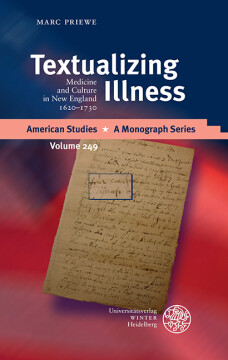
BUCH
Textualizing Illness
Medicine and Culture in New England 1620–1730
American Studies – A Monograph Series, Bd. 249
2014
Zusätzliche Informationen
Bibliografische Daten
Abstract
‘Textualizing Illness’ investigates how colonial New England writings represented and contributed to the meaning-endowment of diseases. It explores how the textual configurations of illnesses changed in the wake of the scientific revolution, growing numbers of non-Puritan settlers and African slaves, and increasing contacts with Native Americans. The representations of colonial body perceptions and illness experiences are often hidden in a broad textual archive and thus require “reading across” different texts and authors to analyze the positions and functions of the sick body in both medical and cultural discourses. In the illness narratives surveyed here, medical issues – from actual practices to intellectual responses to diseases – illustrate how early American literature and society developed a regional distinctiveness while being embedded in transnational circuits of knowledge formation and cultural practices.
Inhaltsverzeichnis
| Zwischenüberschrift | Seite | Aktion | Preis |
|---|---|---|---|
| Acknowledgements | 7 | ||
| Table of Contents | 9 | ||
| Introduction | 11 | ||
| 1. Mobile Pathogens, Traveling Knowledge | 31 | ||
| 2. Writing Cures: John Winthrop Jr.’s Epistolary Healing Networks | 97 | ||
| 3. Scripting Medicine and Gender | 141 | ||
| 4. Conversion and the Rhetoric of Disease | 199 | ||
| 5. Poetic Responses to Illness | 237 | ||
| 6. Thresholds of Modernity: Cotton Mather’s Medical Writings | 291 | ||
| Conclusion | 349 | ||
| Bibliography | 361 | ||
| Index | 399 |


 Publishing Platform by CloudPublish
Publishing Platform by CloudPublish